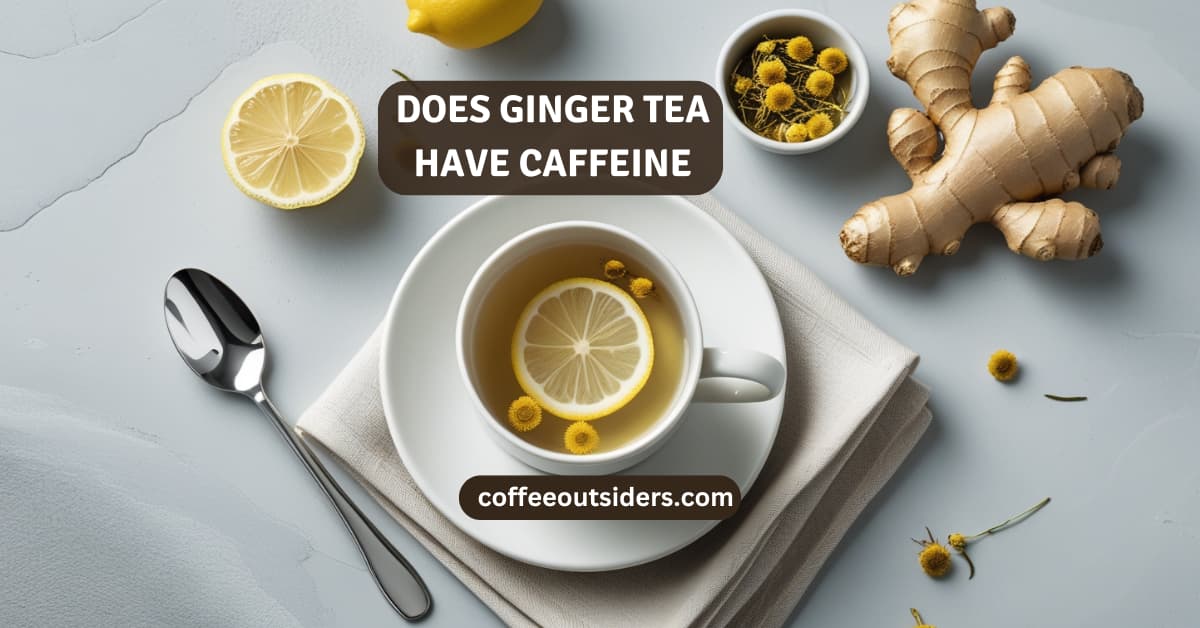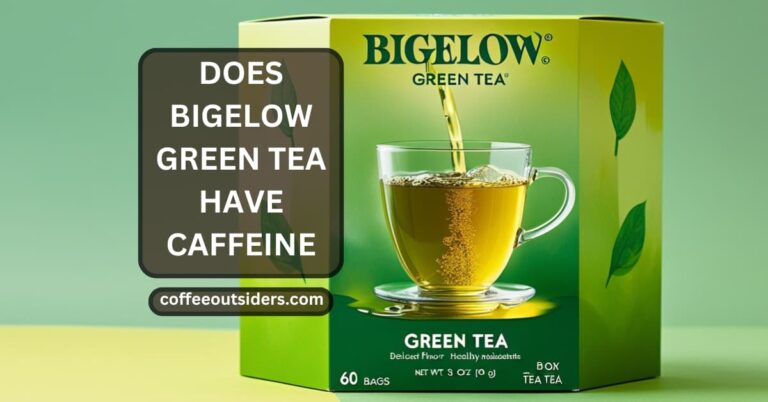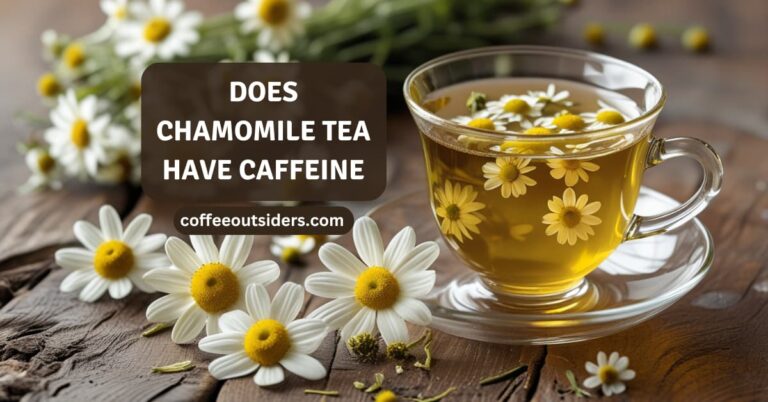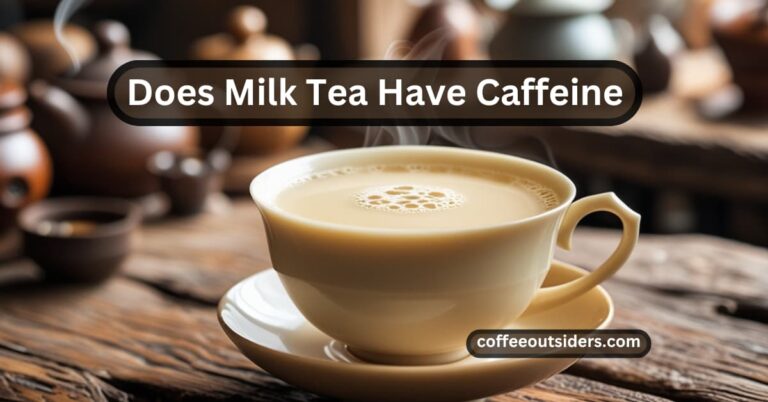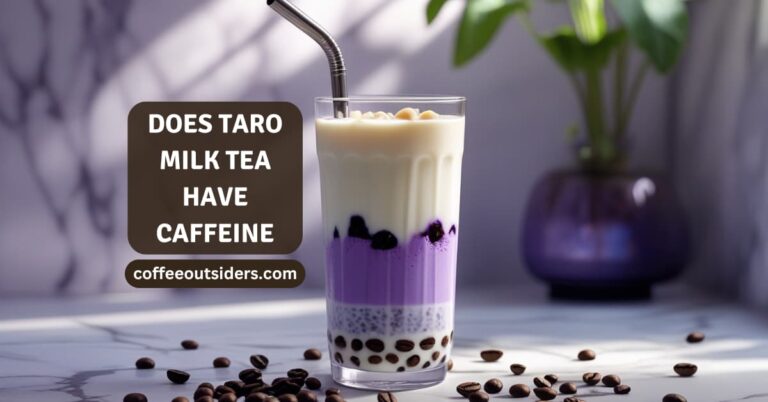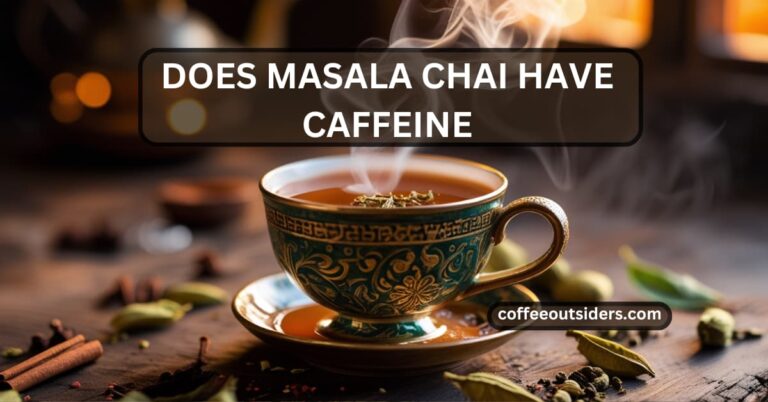Does Ginger Tea Have Caffeine? My Experience and Insights
Ginger tea is a popular drink known for its soothing and spicy flavor, but many wonder if it contains caffeine. Well the answer is no! Since ginger tea is naturally caffeine-free, it’s a great option for anyone avoiding stimulants.
Boil fresh ginger root or dried ginger in hot water for a soothing, aromatic brew. Savor this calming beverage minus the caffeine jitters!
It’s a delicious, easy, natural choice when you want to unwind or support your digestion.
- So ginger tea is naturally caffeine-free. This makes it a safe and soothing option for everyone from toddlers to grandparents, any time of day.
- Ginger tea can help you relax, without the energy spikes or jitters that come along with caffeine in green tea or coffee.
- Whether enjoyed hot or iced, the warming, invigorating spice of ginger tea makes for a comforting drink.
- Ginger tea promotes overall wellness, with benefits including decreasing inflammation, helping to digest naturally, and strengthening the immune system.
- Variations such as lemon ginger tea or adding honey, turmeric, or mint can improve the taste and wellness properties even more.
- Making ginger tea is easy and adaptable, using fresh or dried ginger and customizing potency to taste.
Does Ginger Tea Have Caffeine
When you choose a cozy, soothing drink, it makes all the difference in the world to know how much caffeine is in it. This is particularly important if you’re looking to cut caffeine completely.
What makes ginger tea unique is that it’s completely caffeine-free. Ginger tea is different from regular teas such as black, green, oolong, or white. Unlike those teas, which allude to the fact that they are made from the caffeine-containing Camellia sinensis plant, ginger tea is made from the ginger root.
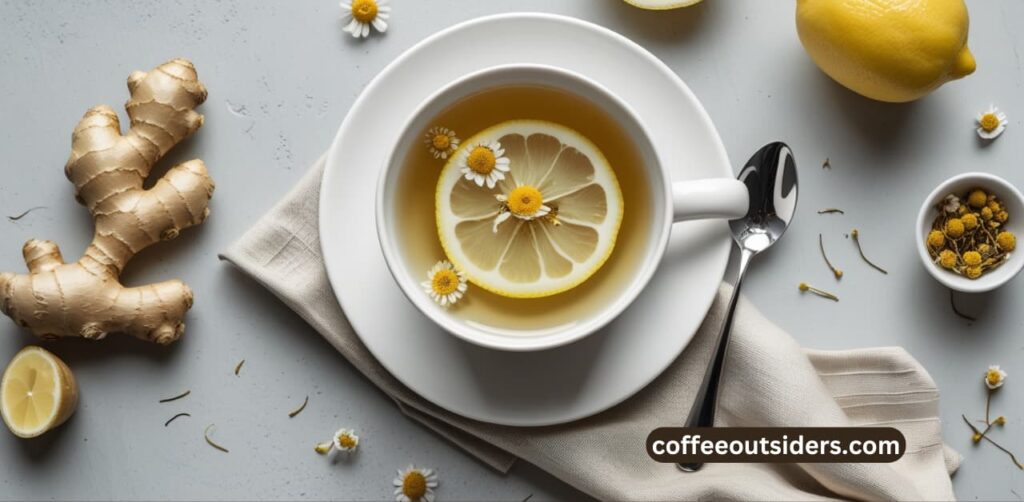
This lovely infusion is entirely caffeine-free too, meaning it’s perfect for anyone looking to enjoy a wonderful beverage at any hour. Savor this delicious flavor without any caffeine jolt!
Ginger tea has been widely consumed for centuries, dating back to its use in Traditional Chinese Medicine. When you steep fresh ginger root in hot water, you create a naturally caffeine-free beverage that’s soothing and versatile.
It’s widely available, in tea bags and loose-leaf forms. This diversity provides you an abundance of opportunities to savor your cup! As you can see, ginger tea is a perfect drink option any time of year. You can drink it steaming on a cold day or iced and cold-brewed come summer!
1. Understand Caffeine Content in Ginger
Ginger tea is naturally caffeine-free, making it the perfect herbal beverage for anyone and anytime. Even children, as well as adults who are sensitive to caffeine, can drink it worry-free.
That quality makes ginger a great option for those who are breastfeeding. The FDA has classified ginger as generally safe and recommends no more than 4 grams of ginger per day. Promotes relaxation by being caffeine-free.
Especially when enjoyed in the evening, it can help promote improved sleep quality as well. For anyone who feels jittery or restless after consuming caffeinated beverages, ginger tea is a soothing option.
Sipping it allows you to relish a cozy drink without the typical caffeine catch-22. You’ll have to worry less about increased heart rates and disrupted sleep!
2. Compare Ginger Tea to Green Tea
Green tea is another widely consumed beverage that can feature high amounts of caffeine depending on its production process. Ginger tea is entirely caffeine-free and remarkably calming.
Both beverages provide substantial health benefits, but ginger tea really stands out with its strong anti-inflammatory abilities. It’s great for digestion and getting rid of nausea.
For anyone who struggles with caffeine jitters, ginger tea is a smoother choice. It provides a cozy, spicy flavor that’s ideal for nighttime enjoyment.
It won’t make you jittery, so it’s a perfect choice for those looking to cut back on caffeine.
3. Explore Ginger and Lemon Tea Caffeine
Another great caffeine-free choice is adding lemon to ginger tea. This addition not only makes ginger tea taste better, but it also adds a zesty, zippy, refreshing quality to the drink, all without the addition of caffeine.
This delicious combination is particularly soothing and can be enjoyed any time of day. The bright, fresh citrus flavor of lemon really brings out the spiciness of ginger.
This mouthwatering mix is what makes it a go-to beverage for anyone looking for a delicious caffeine-free option. So if you’re looking for a caffeine-free alternative, reach for some lemon ginger tea!
It’s a tasty choice that will leave everyone impressed! It contains all the health benefits of ginger tea. Plus, the boost of lemon adds a zesty flavor, making it as ideal for unwinding as it is for rehydrating.
Flavor Profile of Ginger Tea
1. Describe the Spicy and Warming Taste
Ginger root has a very distinct flavor profile with a unique spicy and warming character that sets this ginger root tea apart from all others. Upon first sip, the spicy zing of ginger provides a warm tingle that envelops you from the inside out. This warming effect is why drinking ginger tea is sometimes associated with comfort and coziness.
It’s not hard to understand why it’s a staple beverage in the colder months. The warmth of the ginger makes all your worries melt away. It’s the ultimate partner for a night in, snuggled under a blanket on a cold winter’s eve. Those who enjoy lemon ginger tea will tell you the spiciness makes them feel calm.
It’s especially calming when sipped as a part of their wind-down routine. The flavor is an intense, spicy “zing.” You can naturally offset it without much effort by sweetening it with your choice of sweeteners, like honey or agave syrup to name a few.
This spiciness, when combined with its earthy undertones, produces a flavor that is both rooted and refreshing. As with all concentrated forms of ginger, the flavor can be intense for some first-time users. The great news is that it’s customizable.
With a quick adjustment of the steeping time and maybe some complementary ingredients, its power can be tamed without losing that warming sophistication. Enjoying different ginger teas can elevate your experience even further.
2. Compare Ginger Tea to Caffeinated Drinks
While caffeine-filled beverages work to perk up your system, ginger tea provides a soothing, more tranquil experience. It’s the ideal drink to relax the day away without introducing any caffeine into your body. For anyone looking to replace coffee or energy drinks, ginger tea is a great option.
The warming spiciness opens your senses up in a beautiful way. You can relish it without the anxiety-inducing aftershocks that typically accompany caffeine-loaded beverages. This delicious flavor profile is complemented by ginger tea’s many health benefits.
Like ginger, caffeine has the potential to leave you feeling restless and dehydrated. Ginger tea stimulates digestion and helps relieve nausea or an upset stomach. Its natural compounds, such as gingerol, give it anti-inflammatory properties, so it’s a great alternative to conventional caffeinated drinks.
Whether you’re kicking your day off or preparing for restful sleep, ginger tea is the perfect addition to your day.
3. Discuss Variations with Added Ingredients
Ginger tea’s strong flavor makes it a versatile base to add other flavors to. You can customize it with a variety of ingredients to fit your preferences. Honey adds sweetness and soothing qualities, perfect for a sore throat.
Citrus provides a refreshing twist along with a vitamin C boost. Spices enhance anti-inflammatory benefits for an even healthier drink. Mint or lemongrass can add a layer of freshness to the tea.
Playing with these ingredients will allow you to find the blend that feels the most right and the most delicious to you. Whether you’re looking for a sweeter flavor, a zesty kick, or an herbal profile, ginger tea delivers.
It’s a great starting point for even more creative possibilities. These additions really deepen and develop the flavor. They enhance the general health benefits, giving every cup a chance to be special and interesting.
Health Benefits of Ginger Tea
Ginger tea is a lovely warming beverage on its own. It offers an impressive list of health benefits that improves your health and well-being. Its nutrient-rich profile and natural healing properties make it a versatile addition to any routine.
Ginger tea supports the immune system and calms digestive discomfort. It has justly claimed its spot as a staple cure-all for various ailments.
1. Boost Immune System Naturally
Rich in antioxidants, ginger tea boosts the immune system by fighting off free radicals that may cause the body to weaken. Gingerol, the main compound in ginger, is critical in boosting immune responses.
Enjoying cups of ginger tea on the reg can even help shield you from everyday colds and ailments. For instance, I know from experience that many of us drink one every day, particularly in the winter months to help us feel healthy and robust.
This simple addition to your day can pay off for years to come by improving your immune health.
2. Reduce Inflammation Effectively
With ginger tea’s anti-inflammatory properties, you have a natural approach to keeping chronic inflammation in check. Its active compounds, including gingerol and shogaol, work to relieve pain and inflammation.
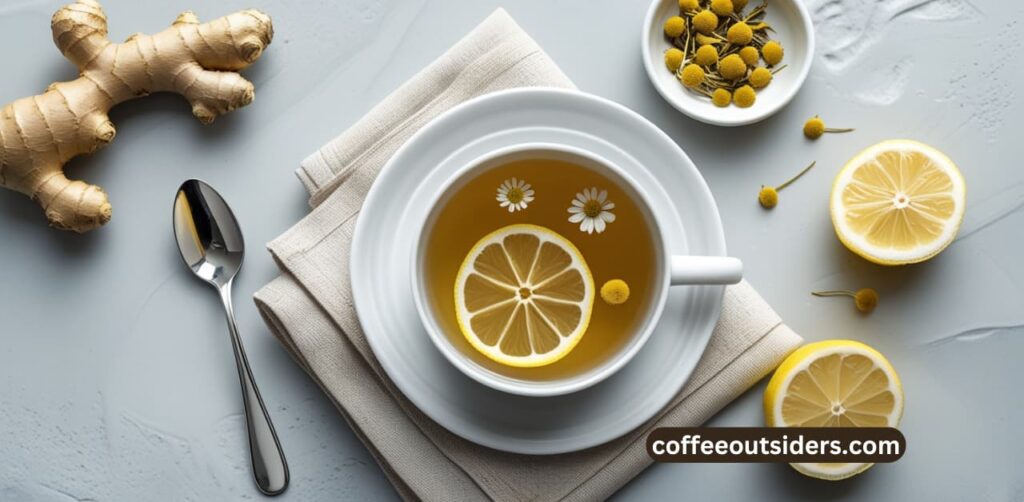
Individuals suffering from arthritis have reported improvements after consuming ginger tea, because it can reduce joint pain. Adding it to an overall anti-inflammatory diet incorporates a new, simple, calming, and delicious approach that can assist in managing conditions linked to inflammation.
3. Relieve Cold and Sore Throat Symptoms
The warming properties of ginger tea soothe you with the chill of colds. It’s particularly effective for alleviating sore throats, coughs, and nasal congestion.
A steaming mug at the first sign of a cold can help you recover quickly and keep your respiratory system healthy. A lot of them complement it with honey, both for additional health benefits and to sweeten the pot.
4. Aid Digestion and Reduce Bloating
Ginger tea is considered a digestive aid because it stimulates gastric enzymes, promoting better absorption of nutrients. It’s a great go-to for minimizing bloating and gas.
Sipping it after meals can ease indigestion and encourage a smooth digestive process. For example, I like to drink ginger tea after a big meal to help me digest and relax.
5. Soothe Nausea and Stomach Discomfort
Ginger tea is most well-known for settling an upset stomach, be it from pregnancy-induced morning sickness or sea-sickening motion sickness. Its calming properties have long made it a go-to natural solution for digestive troubles.
Pregnant people have universally experienced relief by sipping ginger tea, which is safe in moderate amounts and provides soothing comfort.
6. Alleviate Period Pain and Cramps
For easing menstrual discomfort, ginger tea is a soothing, natural remedy. Its anti-inflammatory properties assist in easing cramps and pain.
Drinking a cup during menstruation can relieve the symptoms and promote overall women’s health. We’re confident that it will be a comforting choice for anyone seeking alternatives to OTC pain relief.
7. Reduce Muscle Pain After Exercise
Ginger tea may help you recover more quickly after physical activity by lowering muscle soreness. Its anti-inflammatory effects prove beneficial to athletes, as well as anyone with an active lifestyle.
A post-workout cuppa ginger helps speed your recovery and calm sore muscles. It’s a savvy option for staying active on-the-go!
8. Support Oral Health and Teeth Care
Ginger tea’s antibacterial properties improve oral health by protecting you from the development of gum disease and bad breath. Regular consumption can improve oral health, providing a natural mouthwash substitute.
Its natural antibacterial properties make it a great ingredient to incorporate into everyday care regimens.
9. Potential Role in Cancer Prevention
Emerging research shows that ginger tea can play a role in cancer prevention. Its antioxidants fight oxidative stress, and its anti-inflammatory properties might lower risks associated with chronic diseases.
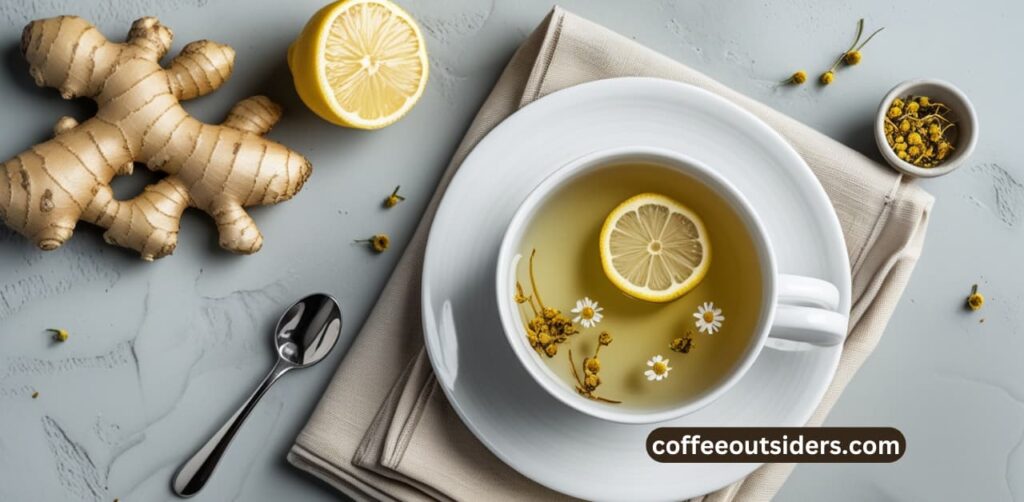
Adding ginger tea to an overall healthy diet will help promote long-term health and offers a delicious new method of improving overall well-being.
How to Prepare Ginger Tea
It’s easy to make a hot cup of ginger tea, particularly a soothing lemon ginger tea, and it’s rewarding, too. Making it’s as easy as following these steps. Don’t worry — you have loads of chances to play around with different ginger teas and make it your own. Here’s how to make the perfect cup.
- Using a vegetable peeler, remove the skin and then grate or slice fresh ginger root. Use about 1 ½ inches of fresh ginger, or about 5 grams. Peel ahead of time. Peel only what you need, as unpeeled ginger will keep for longer. This will help release the flavor, so use a microplane or very sharp knife to grate or julienne it finely.
- Bring water to a boil, and add ginger. Balance the tea to your liking using water, using about 1 cup water per serving. Add ginger to boiling water. Bring it to a boil, then reduce to a simmer for 10 to 20 minutes depending on how strong you want your tea.
- Allow to steep for 5–10 minutes, then strain. If you’d like a lighter tea, just steep the ginger in boiling water for 5–10 minutes. Strain the tea, and you’re ready to enjoy.
- Try different steeping times. You can adjust steeping time to strengthen or weaken the tea. A longer steep will yield a bolder brew, while a shorter steep will give you a gentler taste.
- You can use powdered ginger or tea bags for a quicker method. If fresh ginger is not an option, dried ginger or prepackaged ginger tea bags are wonderful substitutes. They offer the same benefits as the whole root ginger and are simple to store and use.
- Choose fresh, high-quality ginger. Regardless of whether you use fresh or dried, choosing high-quality ginger will get you all the flavor and health benefits you desire. For the freshest ginger, look for firm, smooth-skinned knobs.
1. Use Fresh or Dried Ginger
Fresh ginger makes a great, bold, refreshing tea. It contributes a deep, warming spice that you can taste in each and every sip. Dried ginger gives a more mellow flavor and has a longer shelf life than fresh ginger. This makes it a great choice for those who don’t have fresh ginger on hand all the time.
Whether you choose fresh or dried ginger, both are packed with healthful benefits, such as improving digestion and easing inflammation. I suggest making one of each and trying them both to see which one you like better! I do love the zing of fresh ginger, but I always have dried ginger on hand for those go-go-go days.
2. Add Complementary Ingredients for Flavor
Ginger tea is incredibly versatile, and adding complementary ingredients can elevate the experience. Honey adds a nice touch of natural sweetness that balances the spiciness of ginger.
Lemon juice adds a bright zing and increases Vitamin C levels. Cinnamon adds a warm, comforting taste that complements ginger perfectly. Playing with these ingredients can lead you to exciting new combinations.
I love drinking ginger tea with a little bit of cinnamon and some lemon. It’s the ideal comforting treat for chilly days! Each addition is delicious on its own, and they are all a delicious way to boost the medicinal efficacy of ginger tea.
3. Adjust Strength to Personal Preference
The great thing about ginger tea is that it’s highly customizable. I recommend you begin with a small amount—perhaps ¼ teaspoon of grated ginger—and experiment to find the flavor profile you prefer.
If you want a more potent tea, add more ginger or steep longer. On days when I crave a lighter tea, I cut back the steeping time to only 5 minutes. Milk should be tried—around 2 cups (473 mL)—for a creamy variant.
Making the tea your own can turn every cup into a special moment.
Conclusion
A hot cup of ginger tea provides a cozy, caffeine-free approach to experience a spiced, calming beverage. With its zesty kick and natural sweetness, it’s an invigorating treat any time of day. In addition to its strong flavor, ginger tea aids digestion and alleviates nausea. Its simple goodness can provide the reassuring comfort we need when we’re sick.
Making your own ginger tea is easy. Fresh ginger, hot water and a touch of honey or lemon make a comforting cup in minutes. You don’t have to have a bunch of fancy stuff—just a few simple ingredients.
If you want a caffeine-free drink that’s rich in flavor and full of health benefits, ginger tea is it. With that in mind, we hope you give ginger tea a try and discover how it can bring a bit of cozy goodness into your day.
Frequently Asked Questions
No, drinking ginger tea doesn’t have any caffeine. Brewed from ginger root, this herbal tea is the perfect caffeine-free option for those seeking healthy digestion.
So, is ginger tea caffeine-free? Yes, drinking ginger tea is a great option for relaxation. Its soothing properties can help promote healthy digestion and calm the body in advance of sleep.
Ginger tea, known for its warm, spicy flavor and sweet ginger flavor, is super refreshing and energizing, adding a little zing from ginger’s natural spice and numerous health benefits.
Ginger tea, especially ginger root tea, aids digestion, alleviates nausea, and can help combat inflammation due to its antioxidant properties.
Slice fresh ginger root (about 1–2 inches) to brew ginger tea, boil it in 2 cups of water for 10 minutes, then strain. You can add honey or lemon ginger to enhance the flavor.
True or false—drinking ginger tea is effective for calming nausea. This herbal tea is a powerful remedy for nausea, bloating, and indigestion.
Is drinking ginger tea safe to enjoy every day? Definitely check with your doctor if you have any underlying health concerns or issues.

